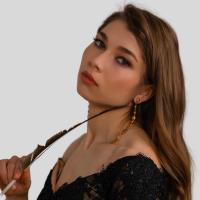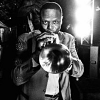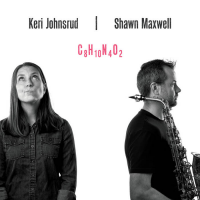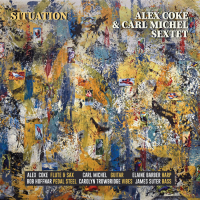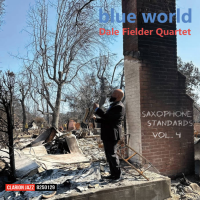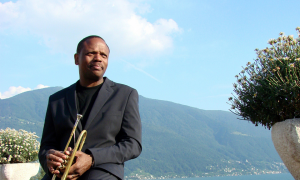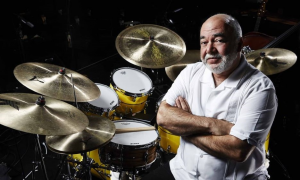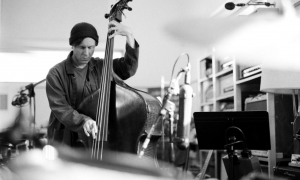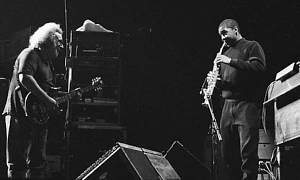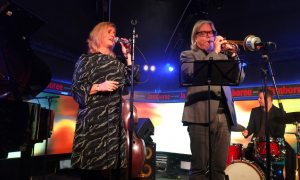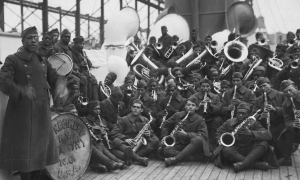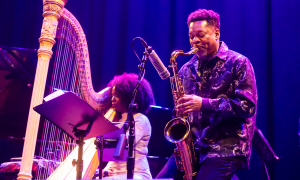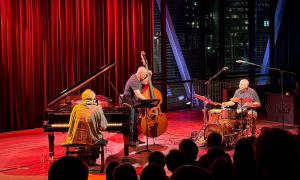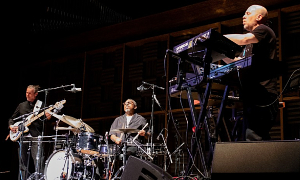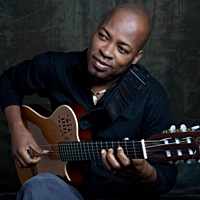Home » Jazz Articles » Interview » Echoing the Angel Gabriel: Leroy Jones and his Signature Sound
Echoing the Angel Gabriel: Leroy Jones and his Signature Sound
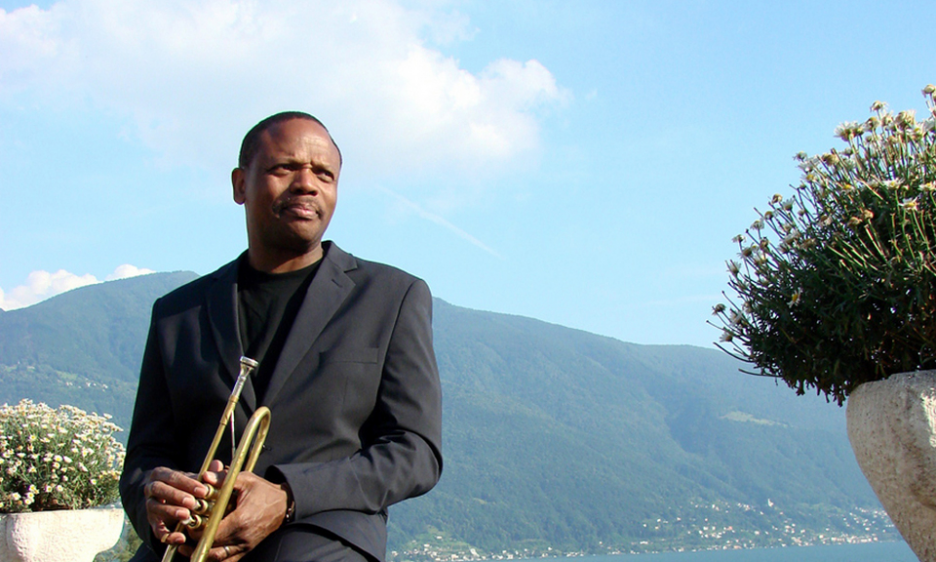
Courtesy JazzAscona
There is a divine purpose for me here to have a message through music and to inspire people to love each other...
A few years later, after the conference, the hero of this story came in a way as a teacher for those who were ready. His mellow trumpet sound and original compositions instantly grabbed the attention of eager listeners approaching the open air JazzAscona stages back in 2019. It was the Grand Maestro himself, the outstanding master trumpeter, a 'keeper of the flame' for traditional New Orleans jazz, Sir Leroy Jones. Now let the preface give way to a new paragraph, the story itself: a meeting with a guru whose signature sound is as if he echoes the heavenly vibrations of the Angel Gabriel.
A member of the New Orleans Hall of Fame, a regular at Preservation Hall, a featured performer in the Harry Connick, Jr. Orchestra—the list goes on and on. And so does the list of the character traits that make Jones an incredible human being reflecting in his sound. Positive, open-hearted, modest and friendly, he generously shared his light and wisdom throughout his conversation with AAJ. As mentioned on the "Spirit of the New Orleans" website, Jones performed on every continent and in every major US city, and his television appearances include The Tonight Show, Good Morning America, Late Night with David Letterman, The Today Show, Arsenio Hall, Conan O'Brien and Oprah Winfrey. He has also appeared on the soundtrack of the hit movie Sleepless in Seattle starring actor Tom Hanks (1993).
As LA Weekly has said of Jones, "His trumpet sings with gorgeous flawlessness." From the very first notes it becomes apparent that his is the sound of harmony, the echo of the divine, mesmerising, warming, embracing the listener with peace and joy. There is something in that sound that words cannot describe in full.
All About Jazz: Being fascinated by your trumpet sound, I'll start with the same question I had posed at an earlier press conference: What does the trumpet mean for you as an instrument?
Leroy Jones: The trumpet for me, with its sound and position in the band, is an instrument that takes the lead, especially in typical jazz ensembles of New Orleans, where I come from, where the trumpet is in the frontline with the trombone and always carries the melody. Trumpet delivers the melody within the ensemble parts. So, even in the brass bands, which are very popular in the city of New Orleans, the trumpet is usually there to lead other instruments. I think that I am not a typical trumpet player because I prefer playing trumpet in a more delicate quiet manner. I tend to have very distinct articulation that people recognise. Once, I was even told about playing saxophone in my hotel room here. I was practicing without putting a mute and there was a call from the front desk, a woman said, "Excuse me, Mr. Jones, the guest in the next room is complaining about your saxophone practicing." I said, "I am not practicing a saxophone" and finished the call.
Then, the next day, she knocked on my door and said, "Mr. Jones, sorry, the guest next door is really angry because you're playing saxophone." I wondered, "Why? I am not playing the saxophone, I'm playing the trumpet!" Then the receptionist left and I came to them and said, "I'm sorry, I've been a smart aleck. it's my fault. It's 5 p.m. and I thought that no one would be trying to go to sleep at that time, and I don't play very loud" (laughing). So...Just a funny story... I try to be musical when I play the instrument and I want to be lyrical, want to be able to improvise, to play as many notes as I require or as few notes as I need to express myself. Oftentimes when I listen to music I like, I am not necessarily listening to other trumpet players. These can be my favorite jazz pianists such as Harry Connick Jr, for instance...I take their improvisations and analyse these ideas from the trumpet perspective. But I do not think of myself as of trumpet player but as of instrumentalist.
"Sweeter than a Summer Breeze," "Paradise on Earth"
AAJ: Dear Mr. Jones, apart from being the instrumentalist and trumpet player, you are also known as a great arranger and composer. I think that your vision of how the trumpet should sound is truly reflected in your art: very delicate indeed. As the Offbeat magazine states, it is "effortless, sweet and polished." I would also add that both your sound and music are marked with a presence of "effortless mastery." Let's talk a bit about your composition: "Sweeter than a Summer Breeze." A true chef-d'oeuvre, filled with a delicate sound of not only horn section but also of strings that we hear in the opening, so classical and beautiful. If described with a colour, to me it would permeate the colour of white: transparent, clear, emanating peace. You address this piece to everyone seeking love or experiencing it. Could you share more about this composition?LJ: I am very flattered and would like to thank you, I am glad you enjoyed it. Actually, this piece came out with a string section in 2009, but before that, I made it only with a rhythm section in the year of 2000 entitled "Back to My Roots." That was an independent release, I produced it myself. A couple of years later I redid it because I began to experiment with adding string orchestrations. I also played flugelhorn in that particular piece, because it has a very warm sound somewhere in between trumpet sound and that of French horn. And I also love the sound of a cello: that's why there are parts that are written for two violins and four cellos, which we then doubled. I like to believe in the mellow tone of the flugelhorn with the cello and the strings.
"Sweeter than a Summer Breeze" is an instrumental piece about love, but it is also about hot summer days in New Orleans where the heat is sometimes so strong with humidity being high, especially when there is no breeze. So I had the idea that in these hot summer days there could be nothing sweeter than a breeze. This is basically where the idea came from. Recently one singer from the UK has sent me the lyrics she wrote for this piece, and they fit quite well, actually...
AAJ: Speaking about lyrics, yesterday during your gig in Ascona, I listened to your original song "Paradise on Earth," dedicated to New Orleans. I haven't been in New Orleans so far but when I heard those lyrics I just thought how well they corresponded to Ascona as well. People hanging around, smiling faces, jazzy vibes... Do you feel that similar atmosphere both in New Orleans and in Ascona, which actually became the first place in Europe where the New Orleans Jazz Festival got established?
LJ: Oh yes, this is a slice of heaven. My first visit of Ascona was in 1995, as a sideman with a band from New Orleans. Every year thereafter I came as a frontman. In 1996 I came with a trombone player Craig Klein, and the year after I brought the band from New Orleans and we became very popular at JazzAscona festival, having performed here 10 years in a row. We were here for the entire length of the festival, for 10 days, which was wonderful and gave us time to meet our music friends from Europe and make new friends and to see fans coming every year to listen to our music. And to just enjoy the beauty of the nature in Switzerland, of this Lago Maggiore, to walk around this old town of such a unique atmosphere. It is paradise, so I agree with you that those lyrics correspond with nature and things here in Ascona, especially during the festival time. It is so picturesque, people are friendly just like people in New Orleans: they are very hospitable, they like food, they like to cook and to eat, they like music and dance.
The piece "Paradise on Earth" was actually composed by my wife, Katja Toivola, who is a trombonist. She is from Helsinki, Finland, and she wrote that song. The recording of that song was initially been done with a singer Tricia Boutté, who is from New Orleans but lives in Norway. We did it in a band called "New Orleans Helsinki Connection." I've just begun to sing this song, changed the key for my voice and added this song to my repertoire. We do it often because people seem to really like it. This song mentions all those things of New Orleans: "Crescent bound...friends... food...a second line...red beans...Donna's bar," which was in the French Quarter back then and "Mardi Gras and Indians...calas, beignets, and CDM...the oak trees...the scent of magnolias." Another singer from the UK even did a cover of this song on the ukulele and posted it on Youtube because she liked the song and Katja's lyrics so much. This piece is also about the post-Katrina time when we were evacuated, it's all good now but at that time when we were away, Katja thought about these lyrics because she said, "If there is any place that I want to live in the USA, it's New Orleans and nowhere else. It's a "Paradise on Earth."
I do believe that there is a certain spirit—which is also energy—that can convey a reality...
AAJ: Do you believe that the energy of such places as New Orleans or Ascona, "paradises on Earth," let's say, influences the improvisation process?LJ: I do believe that there is a certain spirit—which is also energy—that can convey a reality...As you said as well, I also like to look at musical tones in colours. When I hear chords I see them in colours. It helps me to better understand and learn tunes rather than thinking so much mathematically about certain chord being C7, diminished, 11 or 9. But visualising certain colour to certain sound is helpful and it has something to do with a place, too. It is also about understanding the audience, people who come and provide you with a channel to perform in a certain way, causing you to be creative. People who come can be non-musicians, but they love music and ears are their instruments. And I always tell them that without you, musicians can't serve their purpose -music is for the people, it is not a selfish thing. I know musicians who bring it to the level when music is spiritual, it feels that it is stimulating the soul of listeners and inspiring. Then for musicians and bands music fulfills its purpose.
I try to improvise in a very melodic manner
AAJ: Would you advise to other musicians to be open to audience needs when improvising? What is necessary for the successful performance?LJ: When I speak about jazz improvisation, I also think about the audience. Older audience, who have been around when swing was the popular music, loves it because that's the music they remember when they were very young. And usually those audiences are the ones who come to listen to traditional jazz that I also play, as opposed to the avant- garde or alternative jazz. That's why I try to improvise in a very melodic manner. Although I am far away from playing the exact melody of a song, whatever I'm playing is on the chordal harmony so that people can still hum along even if I am playing around the melody, embellishing it. I improvise on the chord changes where people can relate to it. I can keep their attention so that they don't get bored, I am not playing something that is maybe far over their heads, so to speak. It is still something that gets respected by my peers, musicians that know it is about trying to make something easy to listen to, although it is complicated and difficult.
AAJ: Yeah, effortless mastery...
LJ: Yes, that's right. So I would advise young musicians, and trumpet players, in particular, to always remember to consider the audience that is coming to listen to you. Especially the audience that have paid to come to you and have driven from wherever they come from, from many miles away, to get a bit feeling of the music. I think it's important to remember that we deliver something that will be taken away with them, and it should leave a good feeling, should bring some joy.
AAJ: You once told that you like saying: "my one foot is in the past, another one is in present, and I see the future." So, that also means seeing how music may influence people's lives as well...
LJ: Absolutely! What I am doing is expanding on what has done before by my mentors, jazz innovators from years past. And trying to put my own stamp on it, where I have a unique voice signature of mine that people and musicians recognise. Every musician has their signature once they are matured to perform, when they have mastered the instrument to a point when it has a sound. I've always been taught that you must have a sound even if you play one note or half-note, that "sound" is an important thing. Not necessarily how fast you can play, or how many notes you can play in one measure. The sound is important. And people recognise the sound right away because like the human voice that's your tone. I feel very satisfied when musicians and music lovers come and say: "Oh, I know that, from the very first two notes, I know: that's Leroy!." I think that keeps me motivated to continue to practice the instrument no matter how old I get so that when I am on the stage and have a performance I can try to give my best.
AAJ: Do you think that in order to get that very sound, unique for a musician, there is something that goes beyond technical abilities? Is it about playing with a soul? I mean, has the energy of musicians and their thoughts something to do with the soulfulness of the sound and how such can be attained?
LJ: It is a combination of all those things. Having a technical proficiency, to be able to play what has been defined as "honest playing," when it comes from the heart and it is not just a bunch of notes, scales and technical rhythms that any student can do and play. And they sound just like each other. If you have control over the instrument, you are able to express yourself, what is coming to your mind and heart. It's important for young musicians to think that people come to be fed. In essence, Musicians are like Ministries (laughs), and therefore you need to have something that is intangible but it can be felt. It comes with diligent practicing and listening to music because improvisation is a language with many dialogues. And in life first comes the hearing and then the speaking. So whatever you've been listening to, eventually it's bound to come out. According to how proficient you are in that instrument...
I believe that the Angel Gabriel is a lead trumpeter out there...
AAJ: Thank you very much for these insights, dear Mr. Jones. One of our last questions is about your vision of life... As I said before, "Sweeter than a Summer Breeze" may evoke a colour of white which tends to bring associations of God imagery, let's say, or those of a universal wisdom, harmony, and peace. It also evokes a feeling of love existing as a reflection of the divine in our lives. What would be your perception of God?LJ: God is everywhere. I thank God every day for my talent; I think I have been blessed with a gift that comes from God. There are a lot of musical families in New Orleans: both of my parents played music in our house but they were not professional musicians. I have three younger siblings who doubled a bit with musical instruments when they were in school but after a couple of years, they decided to do another vocation. And they do very well as adults now, successful with their lives and families. But that just wasn't something for them. Before I was big enough to pick a trumpet or clarinet I was always intrigued by the music from old recordings and I could not wait till I become 10 years old to take part in school bands and enjoy music lessons.
My parents never had to tell me to practice. You often hear these horror stories about parents forcing their kids to go practicing for piano lessons. I think that with my children I won't force them to play anything if they don't want it. But if they see my example and they like what they're doing, then it's okay. Whatever they want to do, as long as it is a good thing and makes them happy and does not hurt anyone else, is fine. That's the way it has always been for me. To these days I love to play; I believe that the Angel Gabriel is a lead trumpeter out there and I pray that someday I will go that way and I would like to be in that section... I know there are many others who are out there now.
I definitely believe that there is a divine purpose for me here to have a message through music and to inspire people to love each other no matter what they look like...and I think that the music that I chose to play in my life brings people together in many different walks of life. Everybody comes together and there is no war, it's about peace and happiness. This music, particularly traditional jazz, is something that brings people together, it is happy joyful music. There is nothing political about that.
AAJ: That's why I like music journalism, too. And I am grateful to life for having granted me an opportunity to have a conversation with such a great person and a true master musician as yourself, dear Mr. Jones. Thank you very much!
LJ: Oh, thank you, Taliya! I appreciate your questions and I am delighted that you chose me as one of your interviewees.
Tags
Interview
Leroy Jones
Taliya Hafiz
Switzerland
Wendell Brunious
John Michael Bradford
Kevin Louis
Shamarr Allen
Harry Connick
Comments
PREVIOUS / NEXT
Leroy Jones Concerts
Support All About Jazz
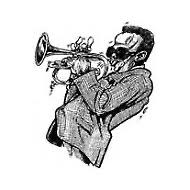 All About Jazz has been a pillar of jazz since 1995, championing it as an art form and, more importantly, supporting the musicians who make it. Our enduring commitment has made "AAJ" one of the most culturally important websites of its kind, read by hundreds of thousands of fans, musicians and industry figures every month.
All About Jazz has been a pillar of jazz since 1995, championing it as an art form and, more importantly, supporting the musicians who make it. Our enduring commitment has made "AAJ" one of the most culturally important websites of its kind, read by hundreds of thousands of fans, musicians and industry figures every month.

